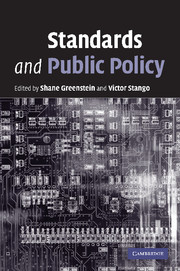Book contents
- Frontmatter
- Contents
- List of figures
- List of tables
- List of contributors
- Introduction
- 1 Standard setting in markets: the browser war
- 2 Competition through institutional form: the case of cluster tool standards
- 3 The economic realities of open standards: black, white, and many shades of gray
- 4 Coordination costs and standard setting: lessons from 56K modems
- 5 Promoting e-business through vertical IS standards: lessons from the US home mortgage industry
- 6 Intellectual property and standardization committee participation in the US modem industry
- 7 Manipulating interface standards as an anticompetitive strategy
- 8 Delay and de jure standardization: exploring the slowdown in Internet standards development
- 9 Standardization: a failing paradigm
- 10 Standards battles and public policy
- 11 Switching to digital television: business and public policy issues
- 12 Should competition policy favor compatibility?
- Index
- References
4 - Coordination costs and standard setting: lessons from 56K modems
Published online by Cambridge University Press: 22 September 2009
- Frontmatter
- Contents
- List of figures
- List of tables
- List of contributors
- Introduction
- 1 Standard setting in markets: the browser war
- 2 Competition through institutional form: the case of cluster tool standards
- 3 The economic realities of open standards: black, white, and many shades of gray
- 4 Coordination costs and standard setting: lessons from 56K modems
- 5 Promoting e-business through vertical IS standards: lessons from the US home mortgage industry
- 6 Intellectual property and standardization committee participation in the US modem industry
- 7 Manipulating interface standards as an anticompetitive strategy
- 8 Delay and de jure standardization: exploring the slowdown in Internet standards development
- 9 Standardization: a failing paradigm
- 10 Standards battles and public policy
- 11 Switching to digital television: business and public policy issues
- 12 Should competition policy favor compatibility?
- Index
- References
Summary
Abstract
The authors offer a detailed analysis of the coordination costs behind the standardization of 56K modems. They focus primarily on market events and standard setting activities during early deployment. They argue that the canonical model for a standards war is misleading in the case of 56K. They present alternative questions than the model's and examine different views on how market events during deployment influenced negotiations within the International Telecommunications Union and vice versa.
Introduction
We offer a detailed analysis of the coordination costs behind the standardization of 56K modems. Although the canonical model of a standards war could be applied to the case of 56K modems, we argue here that the model is misleading and instead offer up alternative questions for understanding how market events during deployment influenced negotiations and vice versa.
There are three phases to a canonical model of a standards war: First, an economic opportunity arises from a technical upgrade. Second, competition develops between different implementations of that upgrade. Third, resolution of the conflict occurs when one of the implementations wins in a competitive market or a publicly spirited standard setting organization (SSO) becomes involved in resolving the conflict (for a review, see e.g., Farrell 1996 or Stango 2004). There are extensive case studies describing a variety of ways for winning a competitive war between fixed specifications.
- Type
- Chapter
- Information
- Standards and Public Policy , pp. 123 - 159Publisher: Cambridge University PressPrint publication year: 2006
References
- 6
- Cited by

